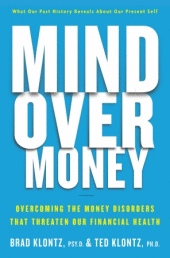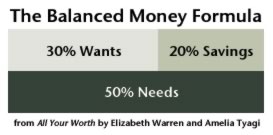How to spend money (even if you think you shouldn’t)
Last year the zipper on my winter coat broke. Not before time, mind you; I'd had it so long that I couldn't remember exactly when I bought it. My best guess is 25 years.
Gut reaction: Oh no! I can't afford a new coat. But of course I could. I have a regular writing gig. Yet I actually thought about getting a seamstress to put in a new zipper.
Folks, this coat wasn't classy even when it was new way back in the mid-1980s. It was a navy blue, butt-length cloth coat with a hood, bought from the clearance rack for about $40. After a couple of dozen years of wear it was fraying badly, especially around the cuffs and pockets.
Paying for a new zipper would have been like putting a new door on a condemned property. Why not apply that money toward a new garment?
- Because I was used to doing without.
- Because I was afraid I couldn't afford it.
- Because I was afraid, period.
Call it a scarcity mentality, call it cheapskatery, call Dr. Phil and have him work me over. The fact is, I had trouble spending money because I remembered the time when I had nothing.
Still Stuck in the Pain
Like someone who'd gone through the Great Depression, I was afraid to loosen the purse strings. Sometimes I still am. And I'm not alone.
 Plenty of the folks body-slammed by the current recession are also fearful, according to Dr. Ted Klontz, co-author of Mind Over Money: Overcoming the Money Disorders That Threaten Our Financial Health. Even after their finances improve, he says, it's likely that some “are going to have a lot of difficulty (taking) care of themselves and their families in reasonable ways.”
Plenty of the folks body-slammed by the current recession are also fearful, according to Dr. Ted Klontz, co-author of Mind Over Money: Overcoming the Money Disorders That Threaten Our Financial Health. Even after their finances improve, he says, it's likely that some “are going to have a lot of difficulty (taking) care of themselves and their families in reasonable ways.”
Spending after a financial crisis is like dating after a divorce, Klontz says. “It's a natural process to restrict it, because you don't want to go through the pain again. What that would tell me is that you're still stuck in the pain associated with that time.”
He's right. To me, hitting the mall would have been as unnatural as signing up for one of those online dating sites. (Even though I do enjoy foreign films, taking long walks on the beach at sunset and reading to orphans.)
After a day or two I came to my senses and got a replacement coat. (More on that later.) It was a good sign that my personal improvement program — aka “Get a grip, Freedman!” — was taking hold.
Before you judge me too harshly, know this: If you've never done without, you have no idea how hard it can be to believe — to really BELIEVE — that the wolf is nowhere near your door.
Instead, you remain in frugal lockdown. You pay the bills, allow for a bare minimum of necessities, and hoard the rest in case something bad happens.
Knowing You Have Enough
These days I think in terms of living mindfully, which some people call living intentionally — i.e., thinking hard about wants and needs and then meeting them in a low-cost, preferably low-impact way.
In other words, I'm not hoarding every dime because something bad might happen. I'm saving so that something good will happen, such as buying a home of my own. In the short term, I'm using a portion of saved funds to do some of the things I want, such as traveling — or buying a coat. (We'll get to that soon. Honest.)
What helped me, and what might help you, was creating a “spending intention statement.” Financial adviser Spencer Sherman suggests making a list of all the basics (including an emergency fund and a retirement fund), plus categories for long-term savings and charity. Pay those bills/honor those commitments each month. Congratulations — you're solvent!
“If you're saving money and you're giving some money away, that's telling you you've got enough — the rest of the money, you can spend,” says Sherman, author of The Cure for Money Madness: Break Your Bad Money Habits, Live Without Financial Stress — and Make More Money!.
So once I've paid my monthly bills, filled the larder with frugal vittles, mailed a check to an elderly relative, set aside money for quarterly taxes, and seen automated monthly savings siphoned off into an online bank, I know that whatever's left over is mine to enjoy.
Sort of.
Where Your Money Goes — and Where it Stays
Should I really want to use up every dime? Should anyone, especially if you're in debt, recently out of debt, or the kind of person who, before layoff, always spent like a sailor on shore leave?
Nope. And nope. That's where the big, bad B-word comes in. Two B-words, actually: budget and balance.
A “spending intention statement” is just a highfalutin synonym for “budget.” As noted earlier, an SIS eases panic and anxiety because it gives you a clear picture of where your money goes — and where it stays. It's control. It's choice.
Suppose you make your bills, continue to fund for the future and enjoy the occasional package of Sweet Tarts. If there's any left over you can choose to put some or most of it into additional categories: new car fund, college savings plan, replacement winter coat. (Nearly there. I promise.)
Don't forget a “fun” category. Fun is a major component of the “balance” side of the ledger. Do without entertainment for too long and you're likely to bust loose and blow the budget. You'll hate yourself in the morning. (The company that holds your credit card will probably send you flowers, though.)
Whether your idea of a good time is a monster truck rally or the New York Philharmonic, that part of the budget is yours to use as you see fit. Don't deny yourself fun — but don't try to run through every possible permutation in the same weekend, either. When coming off a long, dry, fun-less spell, it's best to start small.
Oh, and to pay cash. Choose something you find both wonderful and affordable and treat yourself, using fresh green tender from your wallet. Leave the plastic home. You're less likely to overdo it that way.
Savor and Appreciate
This is especially true if overindulgence was the reason you wound up in trouble in the first place. Learn why that was a problem, lest you repeat this particular history. Did you:
- Try to cover up pain or loneliness by accumulating Stuff?
- Strive to keep up with free-spending peers?
- Have an entitlement mentality?
- Fall into the trap of eating every meal out? (My friend knows a couple who routinely spends $700 to $800 a week in restaurants.)
Googols of self-help and personal finance books exist to help you get to the bottom of your overspending. (You will, of course, get them from the library. Right?) Or you might want to seek help from a therapist, a reputable credit counseling agency or a group such as Debtors Anonymous.
One personal finance expert told me that it's best to initiate or reinstate treats slowly. Maybe add one indulgence every couple of months, whether that's a new video game, a perennial for your garden, brunch with your sister or a therapeutic massage. Just make sure that it doesn't raise your total monthly budget by more than 5%.
Take the time to savor and appreciate each new treat, and to think about when — or whether — to add a new one. Having money once more doesn't mean you can throw it around. (You could put someone's eye out that way.) Even though I'm working to overcome my spending phobia, I'm still striving to meet needs and wants alike as reasonably as possible:
- Group buying vouchers
- Frequent-flier miles
- Frugal culture hacks
- Coupons and rebates
- Discounted gift cards
- Thrift stores
Ha! Told you we'd get there! I needed a coat but I wanted to save money, so I compromised: I went to Value Village in Seattle, where I found a barely-worn Eddie Bauer down coat for $14.99.
Keeping Money in Perspective
Being super-aware of spending isn't a bad thing. It's a reminder to send my bucks toward things that matter. That can be a small thing, incidentally — say, an ice-cream cone with my great-nephews. On a warm summer day while I'm on vacation, ice cream matters.
But I don't need to have ice cream every day. If I do, it no longer matters. (It also plays hob with my cholesterol.) Thus skeptical spending keeps me from piddling away a ton of money on things that ultimately make no difference in my life.
Besides, remembering the tough times helps me keep money in perspective. It reminds me that I don't really need much to live on. It also reminds me how blessed I am: After meeting basic needs I now have the luxury of selecting from among my wants.
So join me. Look for the place between paranoia and profligacy. Look for balance. And look in thrift stores on half-off days. I'm still mildly irritated that I spent $14.99. That coat better last another 25 years.
Become A Money Boss And Join 15,000 Others
Subscribe to the GRS Insider (FREE) and we’ll give you a copy of the Money Boss Manifesto (also FREE)


